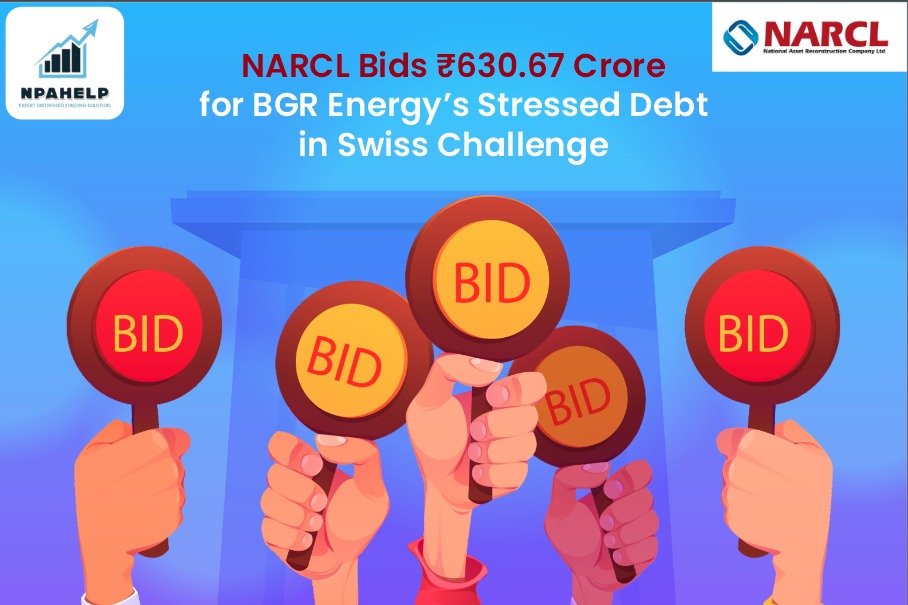
NARCL bids ₹630.67 Crore for BGR Energy’s Stressed Debt
State-sponsored National Asset Reconstruction Ltd (NARCL) has put in an anchor bid of ₹630.67 crore to acquire the stressed debt of BGR Energy Systems by a Swiss challenge auction. The debt pool that is being put on the block by a consortium of lenders stands at around ₹3,512 crore, which implies that lenders would recover about 18% in the first round, if this bid turns out to be the winning bid. This is a big step in India’s ongoing effort to clear off big-ticket non-performing assets (NPAs) and revive stuck infrastructure assets through market-led resolution.
How The Deal Is Structured
NARCL's Resolution Plan is on the lines of a usual Asset Reconstruction Agreement, where 15% of the bid value would be in cash for upfront payment and the remaining 85% would be by way of SRs. The cash component provides an immediate boost to banks in terms of recoveries and liquidity. The SRs help lenders make gains, later if the recovery from the stressed asset improves over time through settlements, asset sales, arbitration wins and business revival. In brief, banks get a little cash now and a share of possible upside later.
Who Are The Lenders and Where Do They Stand?
This is a large, multi-bank exposure with the lead arranger State Bank of India alone having an exposure of about ₹1,698.94 crore, more than 64% the total being sold. Among the other key lenders are Canara Bank, IDBI Bank, Punjab National Bank, Indian Bank and Bank of India. Union Bank of India, Central Bank of India and Bank of Baroda also have exposure. Some private banks—ICICI Bank, Axis Bank and Kotak Mahindra Bank—together hold about ₹165 crore exposure, but that is not part of this sale transaction. For lenders in scope, an 18% base recovery, with upside sharing later, is a pragmatic outcome compared to protracted litigation or uncertain recoveries.
Swiss Challenge Timeline And Process
This sale is being executed through a Swiss challenge, a competitive process to ensure that the best price can be obtained. A process advisor has called for Expressions of Interest (EoIs) and invited due diligence and scheduled the auction with counterbidders quoting at least 5.55% higher than NARCL’s anchor offer. If a superior bid comes up, it must be announced first; then NARCL, as the anchor bidder, will have the right of first refusal (ROFR) to match or better that bid — fully or partly in cash or cash and SRs. If NARCL matches, it wins. If not, the top counterbidder wins. In the absence of any counterbids, the anchor bid by NARCL will prevail as the winning bid by default. This setup protects the effort of the anchor while promoting price discovery in competition.
What Lenders Might Gain Beyond The Base Recovery
The bid terms also indicate an additional estimated net recovery potential of about ₹350 crore for lenders over and above the anchor bid price. Any recovery beyond that is to be distributed among NARCL and other SR holders. The upside-sharing provision is key: It aligns incentives and delivers a fair share to the banks if the asset’s value is extracted more successfully than anticipated.
BGR Energy: A Quick Profile
BGR Energy Systems is a well-known EPC (engineering, procurement and construction) company in Chennai. It was started in 1985 as a 50-50 joint venture with GEA Energietechnik GmbH of Germany, producing condenser tube cleaning systems, debris filters and rubber cleaning balls for thermal and nuclear plants. In 1993, founder BG Raghupathy and relatives became the full owners and the name of the firm was changed to BGR Energy Systems in 2007. The firm had expanded aggressively during India’s power sector expansion, executing turnkey projects and supplying equipment. Over time, sectoral headwinds, delayed receivables and balance sheet strain pushed the company into stress. A resolution through ARC-led acquisition could lead to settlements, asset monetization or strategic restructurings.
Why This Bid Matters For India’s NPA Clean-Up
NARCL was created to resolve large stressed assets (₹500 crore and above) and reduce the NPA overhang in the banking system. Over the last few years, it has acquired several large accounts and identified more for the coming year. Flexible structures—like a cash-plus-SR mix—help balance certainty for banks today with potential upside tomorrow. Successful Swiss challenge outcomes also set transparent price benchmarks, speed up decision-making and can attract more bidders and investors to the stressed assets space. For the broader economy, faster resolution frees up bank capital for new lending and helps revive assets that can contribute to growth and jobs.
What To Watch Next
Key milestones include the outcome of the Swiss challenge auction and whether counterbids are received at a premium over the anchor price. If there were keen competition, it would facilitate recovery for lenders. NARCL, if it’s able to exercise refusal successfully, will be the lead to address the resolution. Post-transaction, recovery actions — settlements, asset sales and operational restructuring — will be the focus to unlock value in BGR Energy's projects and competencies.
Frequently asked Questions (FAQs )
-
What is a Swiss challenge auction?
It is a competitive bidding process where an anchor bid is first placed and then others can submit counterbids above a minimum threshold. The anchor bidder gets the right to match the highest counterbid.
-
Why do ARCs use security receipts (SRs)?
SRs allow banks to share in future recoveries. In exchange, they get some cash upfront and retain SRs, which can become valuable if recoveries on the stressed asset improve over time.
-
What recovery can lenders expect here?
The anchor bid suggests a base recovery of around 18%. There is furthermore potential incremental NRE (if any and upon an outcome) and profit sharing if recovery by the debt buyers exceeds expectations.
-
What happens if no one counters NARCL’s bid?
If no counterbids are received, the anchor bid is automatically declared successful, subject to process conditions being met.